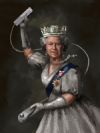|
ESL Forum:
Techniques and methods
in Language Teaching
Games, activities
and teaching ideas
Grammar and
Linguistics
Teaching material
Concerning
worksheets
Concerning
powerpoints
Concerning online
exercises
Make suggestions,
report errors
Ask for help
Message board
|
ESL forum >
Grammar and Linguistics > why do we say "more fun"?
why do we say "more fun"?
|
|

Bruna Dutra

|
Joy... so basically what you �re saying is that fun is not an adjective?
If so... I �m sorry, but you haven �t checked a dictionary.
Fun is an adjective too, a synonyn for ENJOYABLE, like I said, according to the dictionary, not me. I think it �s not about accepting it.
But it �s considered, at least by my Macmillan and my Cambridge dict. not gradable. And since it has one syllable, colloquially, it is used gradably, AND, by natives. You can check it for yourself in this:
http://www.youtube.com/watch?v=cN9KIRnICCI
Well... as I teach my students to speak the language rather than reason over it, saying that both are possible, does the job. But that �s me.
|
25 Nov 2010
|
|
|

Vernica

|
|
Hello
Just checking the Mark Davi�s corpus on British English more fun has got
189 entries whereas funner is not found as querie nor through the syntax [aj*]
but in the Historical American Corpus there are two examples, ONLY TWO AMONG
400 MILLIONS OF WORDS
�
a round hairbrush wrapped with cardboard. # Learning
geography this way � � is much funner � � than having the teacher
read it out of a book, Mantz proclaims.
� Ghost professional.
Which either made it a group of long term serial rapists, even funner
to kill, or... something else. The van finally pulled into
So, taking this into account and If we follow the descriptive grammar,
we shouldn �t teach funner itself like the comparaisson of the adjetive fun, but funnier from funny, and let the other like an old stigma in the language. Thank you
Vero.
|
25 Nov 2010
|
|
|

Vernica

|
|
By the way etymologically
between fun and funny, It was funny which meant humorous: in 1756, from fun + -y meaning "strange, odd" is
1806, said to be originally U.S.
Southern. The two senses of the word lead to the retort question "funny ha-ha or funny peculiar," which is
attested from 1938. Related: Funnier; funniest. Funny farm
"mental hospital" is slang from 1963. Funny bone
"elbow end of the humerus" is 1840; funnies
"newspaper comic strips" is from 1852.
On the other hand,
fun which is previous to funny meant, to cheat probably a variant of M.E. fon
"befool" (c.1400), later "trick, hoax, practical joke," of
uncertain origin. Stigmatized by Johnson as "a low cant word." Older
sense is preserved in phrase to make fun of and funny money "counterfeit bills" (1938, though
this may be more for the sake of the rhyme); sense of "amusement" is
1727 I hope it will be useful
|
25 Nov 2010
|
|
|

ldthemagicman

|
|
My Oxford Dictionary of English says:
USAGE "The use of fun as an adjective meaning �enjoyable �, as in we had a fun evening, is not fully accepted in standard English and should only be used in informal contexts. There are signs that this situatiuon is changing though, given the recent appearance in US English of comparative and superlative forms funner and funnest formed as if fun were a normal adjective".
For what it is worth, I have never heard a British person use funner and funnest.
I can not remember in which film (movie) it was that I heard the amusing phrase, spoken by an American comedienne: "What �s the good of fun, if you don �t have it!"
Les
|
25 Nov 2010
|
|
|

yanogator

|
|
And, Les, "funner" and "funnest" are not very common yet in the US. People would say "Disney World is more fun than the alligator farm." I �m sure many children would use "funner" there, but not most educated adults. If cornered, I �m sure many people would say that Disney World is a funner place (being forced to use it before "place", but I think most people would still avoid that construction and use my earlier sentence.
I think "funnest" is a little less rare, but still not common. "Wow, that was the funnest roller coaster I have ever been on." I think this is because an alternative structure would not flow as well.
That �s how I hear it,
Bruce |
25 Nov 2010
|
|
|

almaz

|
|
Re difference between predicative and attributive:
Am I using adjectives both times when I say, "this discussion is serious"/"this discussion is fun"? You can either accept or reject fun as an adjective here; many native speakers wouldn �t see it as such, although I personally have no problem with it as an adjective (I didn �t even wince when a non-Brit colleague recently referred to a party as �so fun �).
How about "this is a serious discussion"/"this is a fun discussion"? Are both attributive adjectives? If so, you can go for the -er, -est endings with single-syllabic fun. I can �t see a problem other than personal style/taste (I don �t actually use them myself - but that �s just me).
Bruce quite rightly mentions that children are more likely to use �funnest � etc but, since the expression goes way back, you have to accept that kids grow up and still have no problems using the same word (I was hoping to squeeze in a Sarah Palin joke here but it �s too scary).
BTW: Vero, pray tell what is wrong with �cant �, considering that a good many novelists past and present would be speechless without it.
|
26 Nov 2010
|
|
|

jrg2

|
Hey, I �m from Canada. I �m young (no I haven �t been speaking for 60 plus years ) so I know different words from some of you folks. Fact: I always say, "Man, that was so fun" or "That was so much fun". I might even say, "That was way funner than that other stuff". Because to me, saying "That was more fun" or even "That was way more fun" sounds a bit formal and crotchety to me, and sometimes I want to add a different kind of nuance (stupid-esque ) so I know different words from some of you folks. Fact: I always say, "Man, that was so fun" or "That was so much fun". I might even say, "That was way funner than that other stuff". Because to me, saying "That was more fun" or even "That was way more fun" sounds a bit formal and crotchety to me, and sometimes I want to add a different kind of nuance (stupid-esque or what I think is edgy or what I think is edgy ) to my speech. ) to my speech.
Yeah, some of you folks don �t use that, and you might think someone like me would sound stupid when using it. But, that �s one of the many reasons I enjoy using it. It �s like one small little protest against big stuffy old English. Because to me and my friends, it sounds cool. 
John
(I totally support you on this one Bruna Dutra.)
By the way, I mean no offence, but just to illustrate my point a little further... I have never said "Brilliant!" Sounds like Harry Potter to me  |
26 Nov 2010
|
|
|

Jayho

|
|
I too have never heard anyone use funner/funnest apart from young kiddies and ESL students.
BUT
A quick google on Australian pages revealed 4,560,000 results for more fun and 300 for funner as well as a very interesting article (dated May09) which states
Something interesting has happened to the word �fun� recently and for older speakers it�s a little unsettling. Basically, the noun �fun� has crossed the border into the territory of adjectives ... �We had the funnest time" ...
I do not accept funner from my students but maybe I need to reconsider...
Cheers
Jayho |
26 Nov 2010
|
|
|

ICleasby

|
|
As a Native English speaker. Fun and Funny mean two different things.
Jayho I am sure you can remember "Funniest Home Videos" AU or US TV Show.
Funny is defined towards humour and laughter.
adjective, -ni�er, -ni�est, noun, plural -nies. Please add the (i) Funnier or Funniest.
providing fun; causing amusement or laughter; amusing; comical: a funny remark; a funny person.
Example: He is the funniest person in the world.
Fun is a noun.
It is defined as: enjoyment or playfulness:
Example: She �s full of fun.
My example: I don �t want to play with Peter. Nicole is more fun to play with.
As I mentioned two different meanings.
|
26 Nov 2010
|
|
|

Jayho

|
|
ICleasby - yes I fully agree with you however if you read the ABC article that I hyperlinked above you �ll see that in Australia this word is indeed changing. This article, from a reputable source, is 18 months old yet this is news to me.
I think it �s important that we remember that the linguistic landscape is constantly changing - of course it doesn �t mean that we have to agree but it does mean that we have to be aware of how the language changes because afterall text book language is not always real language.
Cheers
Jayho |
26 Nov 2010
|
|
< Previous
1
2
3
Next >
|